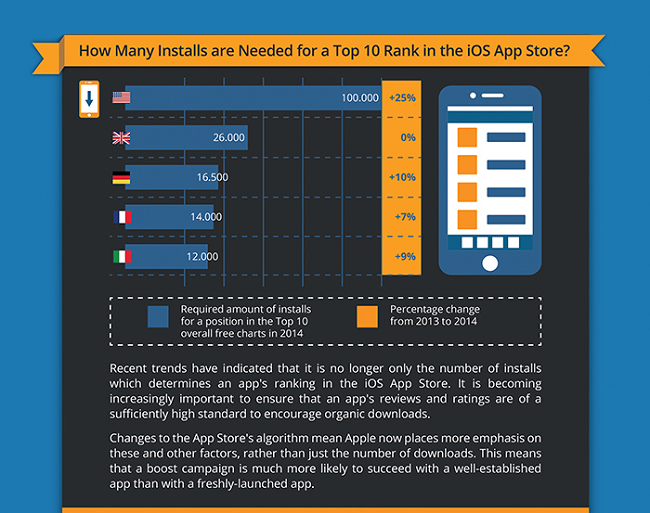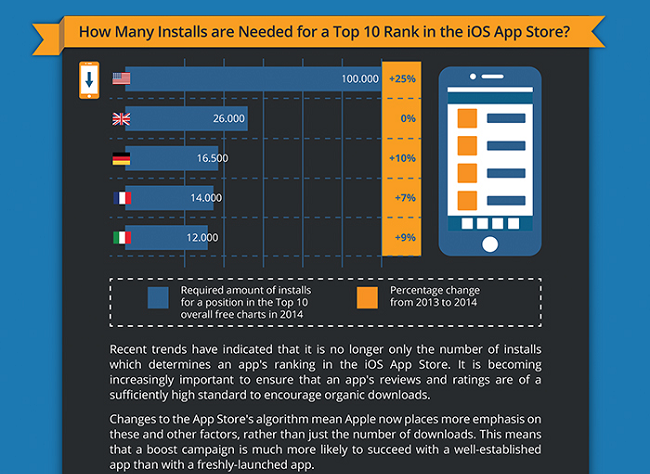Are you trying to get your app on the top rank in Apple App Store? Don’t worry; you can do a few things to improve your ranking. The App store ranking depends on several factors. Keywords, User reviews, Relevance of metadata, and more are just a few of them. If you’re still unsure what they all mean, read on to learn about them. We’ll also touch on how to use them to your advantage.

App store ranking is based on several factors
Several factors determine an app’s ranking in the App Store. One of them is download velocity. If a game app has a high download velocity, it should rank higher than a game with a low download velocity. Ratings also play a role in an app’s ranking. The higher a game’s rating, the higher its chances are of being featured in a top spot.
While the exact factors that determine app ranking aren’t publicly revealed, several factors influence an app’s ranking in the App Store. For example, the game’s name is one of the most critical factors, with an app with a keyword-rich title often ranking 10.3% higher than a game with a generic title. The subtitle, which appears below the title, can be as long as 30 characters.
Keywords are essential
As a mobile app developer, one of the most critical aspects of your app marketing is the proper use of keywords. People use keywords to search for the app you’re creating, so your keywords must be both relevant to your app and easy to understand for the store’s robots. As you make your keywords, you’ll need to continue monitoring keyword searches and rankings and tweak them.
When determining how to maximize your app’s rankings, it is vital to understand the importance of keywords. 82.8% of all iOS apps are classified as zombie apps, meaning they don’t get much search traffic. In addition to keywords, app ratings are essential but are not as important as people may think. Most users will only read the app reviews if they recognize a specific brand.
User reviews are critical
If you want your app to be in the top ranks on iOS, you must pay attention to user reviews. Many people forget to provide the details in their studies, which makes them useless. To avoid that from happening, you should contact your users directly. Try to provide as much information as possible, preferably by sending an email. If possible, attach screenshots of the problem. If possible, respond to the review in a concise, informative manner.
An excellent way to get more ratings is to ask users for them. You can do this through a push notification or a pop-up. If the user is happy with your app, they will likely leave a positive review. Updates should also increase ratings. If your app is updated frequently, users should leave a review to let you know about the improvements. The more reviews, the higher your app will rank on iOS.
Relevance of metadata
Creating and optimizing app metadata is essential for creating a successful mobile app. Apple’s algorithm changes daily, and new keyword terms can affect an app’s ranking. By creating and optimizing app metadata promptly, you can maximize your exposure. Metadata updates should occur every four to eight weeks for iOS and every six to eight weeks for Android. Metadata updates can be strategically planned or timed to coincide with new app builds.
When creating an app, you should focus on two primary objectives: traffic and conversion. While the title has the most significant influence on the ranking algorithm, it also plays a vital role in determining the conversion rate. It would help to incorporate your priority keywords in the title to maximize the conversion rate. While the keyword field of iOS doesn’t directly affect conversion, it is essential to include keywords in the app’s metadata to increase its visibility and traffic.
Impact of multiple languages
One of the most significant factors determining an app’s ranking position in the Apple App Store is localization. While English is the most commonly used language globally, not everyone is comfortable reading all-English content. To improve brand awareness and customer loyalty, a brand should create an app version in the native language of its target audience. Using local vernacular and native expressions can help a brand build a closer relationship with its users and improve overall rankings in the App Store.
If you have a Spanish-language app, it’s crucial to make it available in other languages. The app will likely rank higher in the App Store’s algorithm than an English-language app. In addition, Spanish differs from that of Mexico and Argentina, which can lead to confusion for Spanish-speaking users outside of their country. Furthermore, because different countries have different alphabets and characters, using those characters in your app can give you an advantage over an English app.

